【中考复习方案】2015届九年级英语复习课件(人教):第4课时 Units5—8 Book 7B
文档属性
| 名称 | 【中考复习方案】2015届九年级英语复习课件(人教):第4课时 Units5—8 Book 7B | 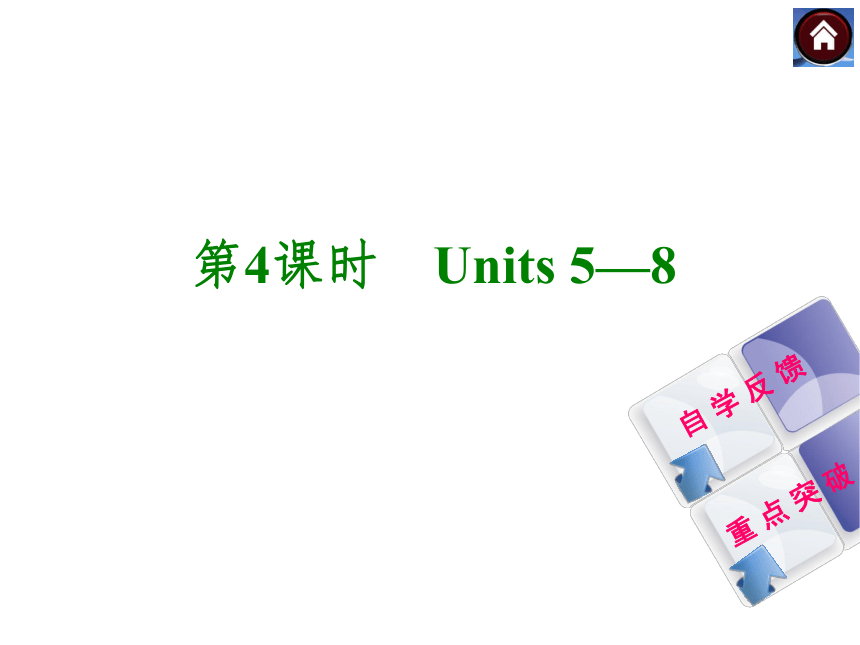 | |
| 格式 | zip | ||
| 文件大小 | 191.7KB | ||
| 资源类型 | 教案 | ||
| 版本资源 | 人教新目标(Go for it)版 | ||
| 科目 | 英语 | ||
| 更新时间 | 2014-12-04 21:57:59 | ||
图片预览

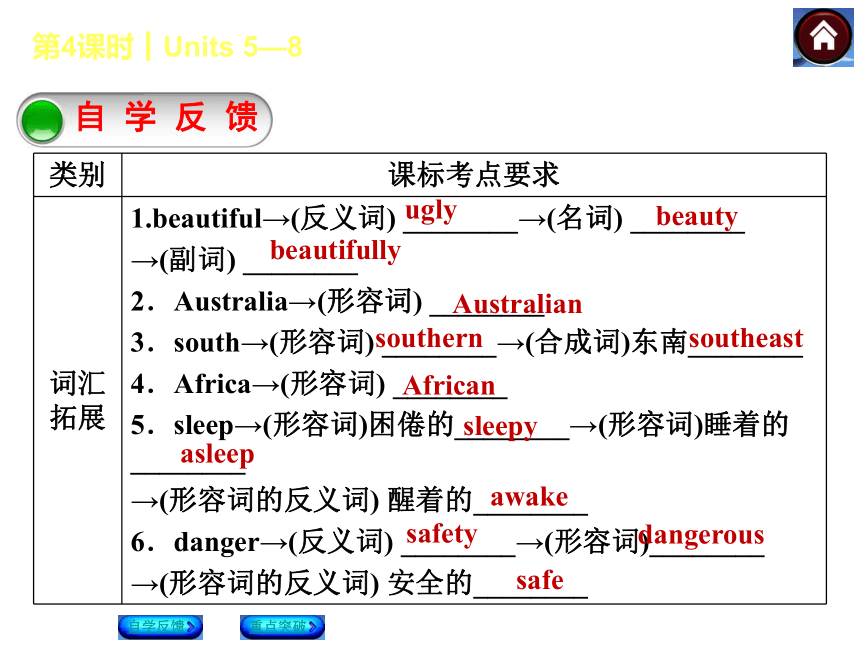
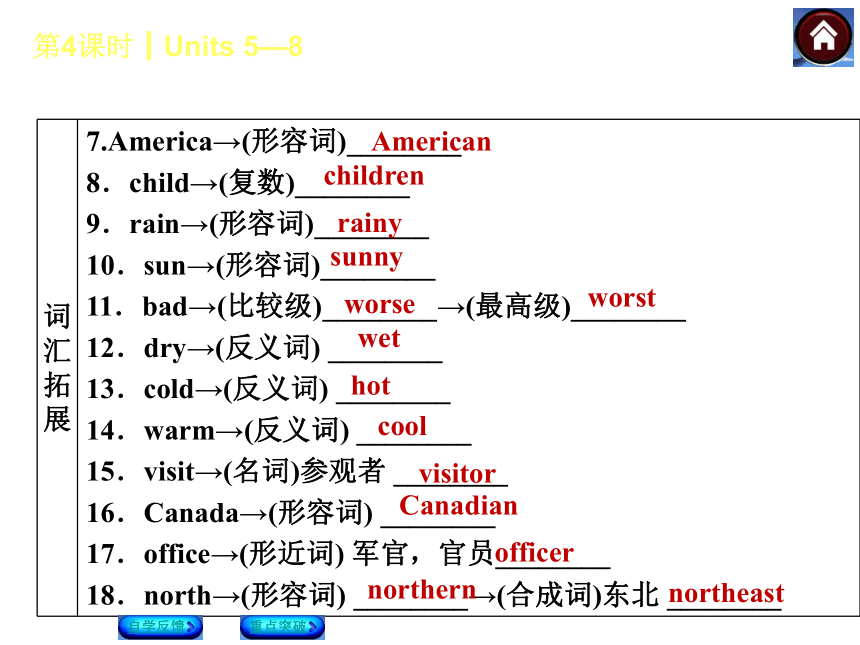
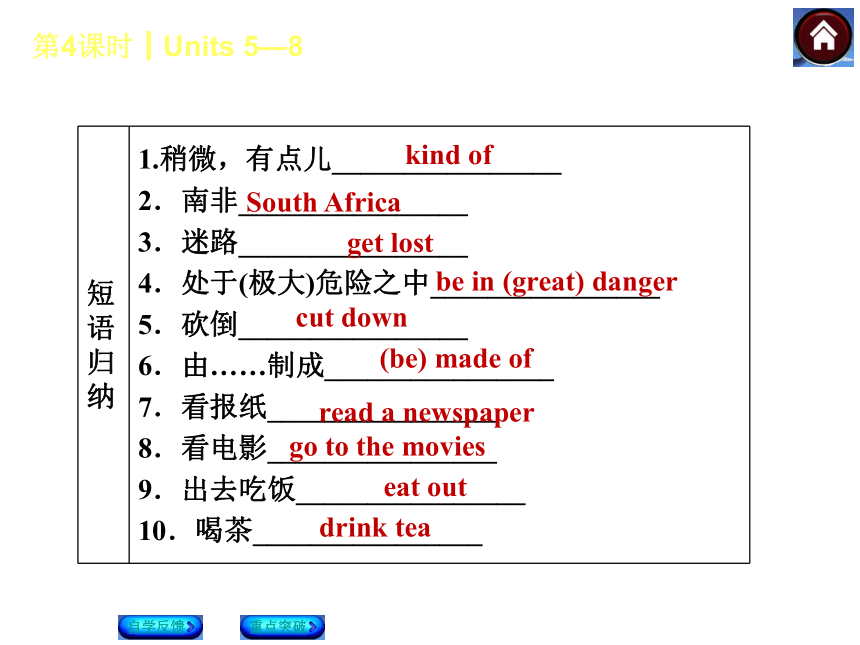
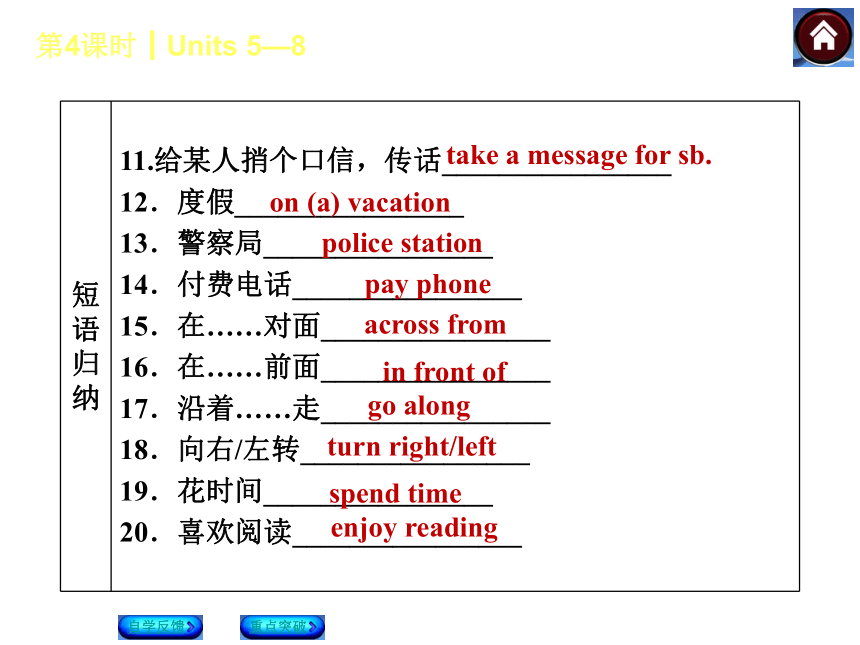
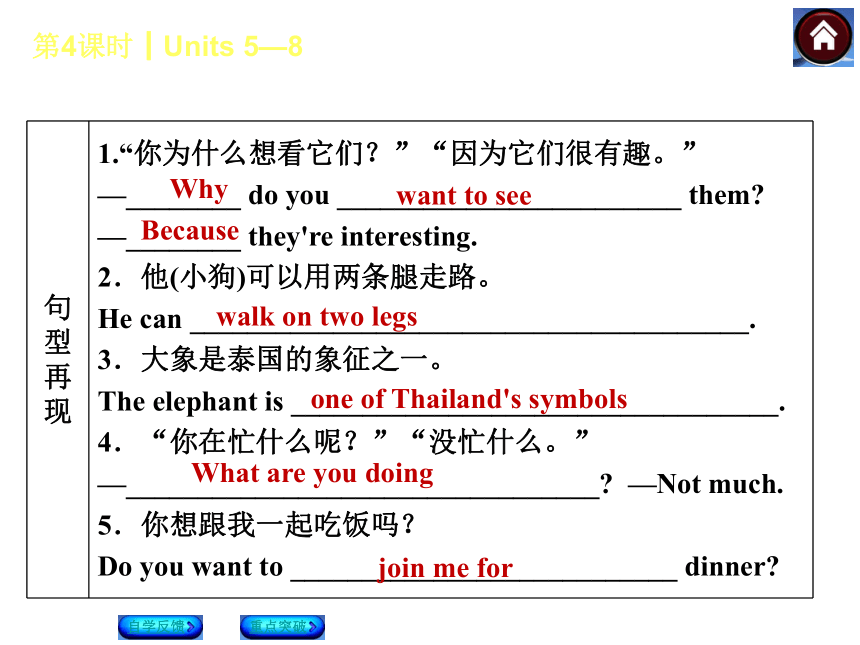
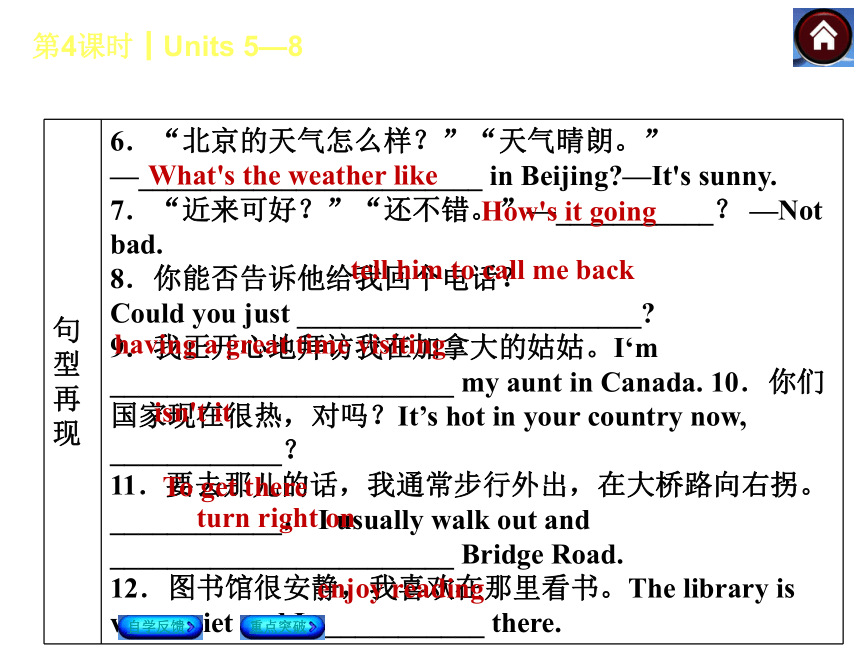
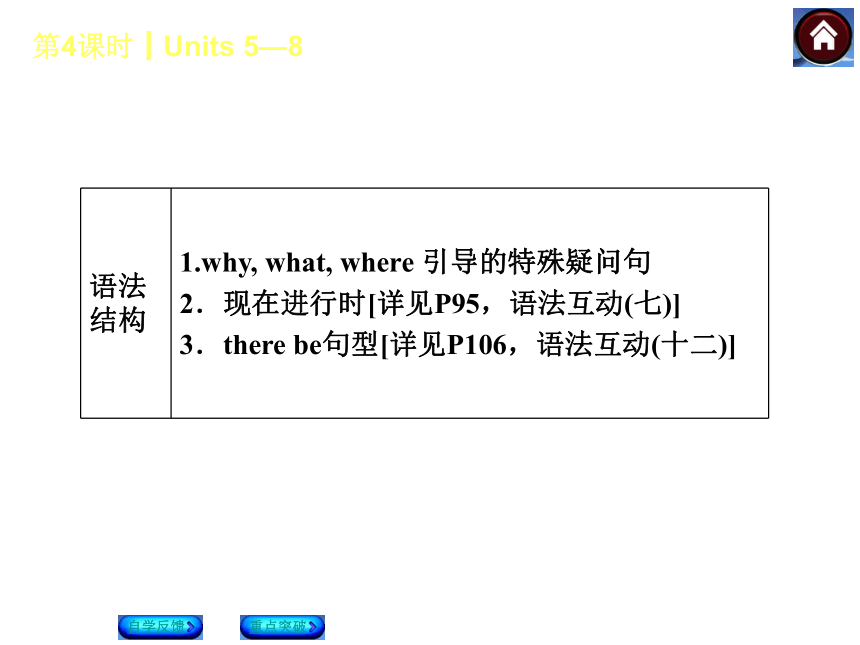
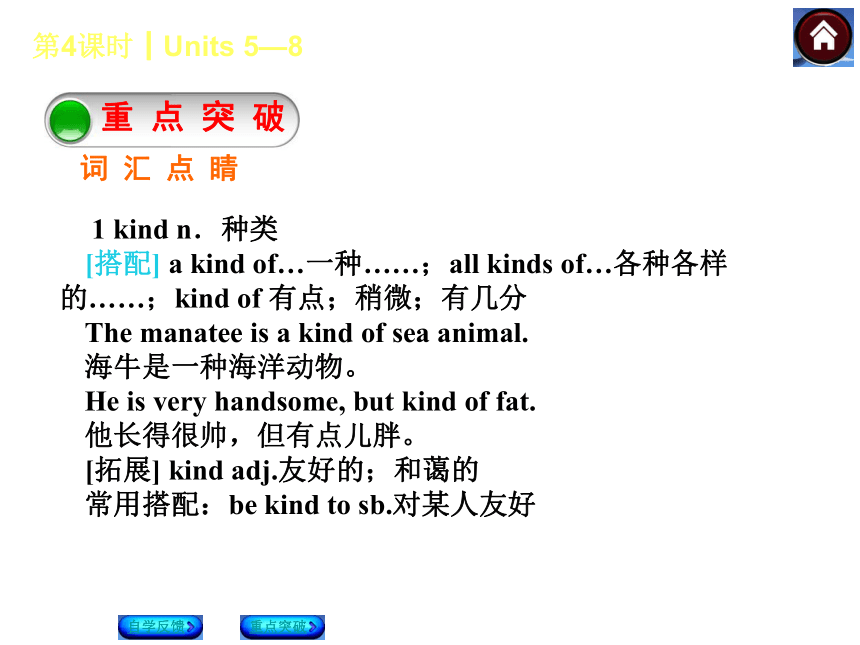
文档简介
课件23张PPT。第4课时 Units 5—8 自 学 反 馈重 点 突 破第4课时┃Units 5—8 自学反馈重点突破自 学 反 馈uglybeautifullyAustralian southernsoutheastbeautyAfricansleepyasleepawakesafetydangeroussafe第4课时┃Units 5—8 Americanchildrenrainyworsesunnyworstwet自学反馈重点突破hotcoolvisitorCanadianofficernorthern northeast第4课时┃Units 5—8 kind ofSouth Africaget lostbe in (great) dangercut down(be) made ofread a newspapergo to the movies eat outdrink tea自学反馈重点突破take a message for sb.on (a) vacationpolice stationpay phoneacross fromin front of go alongturn right/leftspend time自学反馈重点突破enjoy reading第4课时┃Units 5—8 第4课时┃Units 5—8 Whywant to see自学反馈重点突破Becausewalk on two legsone of Thailand's symbolsWhat are you doingjoin me for第4课时┃Units 5—8 What's the weather like自学反馈重点突破How's it goingtell him to call me backhaving a great time visitingisn't itTo get thereturn right onenjoy reading第4课时┃Units 5—8 自学反馈重点突破第4课时┃Units 5—8 词 汇 点 睛 1 kind n.种类
[搭配] a kind of…一种……;all kinds of…各种各样的……;kind of 有点;稍微;有几分
The manatee is a kind of sea animal.
海牛是一种海洋动物。
He is very handsome, but kind of fat.
他长得很帅,但有点儿胖。
[拓展] kind adj.友好的;和蔼的
常用搭配:be kind to sb.对某人友好重 点 突 破自学反馈重点突破第4课时┃Units 5—8 2 enjoy v.享受;喜爱
[搭配] enjoy doing sth. 喜欢做某事
[拓展] enjoy oneself意为“玩得开心”,其同义短语有have a good time和have fun。
They enjoyed themselves in the park.
他们在公园里玩得很开心。自学反馈重点突破第4课时┃Units 5—8 自学反馈重点突破中考典例2014孝感My old neighbor Charles enjoys ________ photos. He always goes out with his camera.
A.take B.to take
C.taking D.tookC第4课时┃Units 5—8 3 miss v. 怀念;思念
[点拨] miss作动词,意为“怀念,思念”。
I'm sure that everybody will miss him very much.
我相信每个人都会怀念他。
[拓展] miss还可表示“错过,未击中,丢失”。
I was late because I missed the bus.
我迟到了,因为我没赶上公交车。
When did you miss your pen?
你是什么时候丢的钢笔?自学反馈重点突破第4课时┃Units 5—8 自学反馈重点突破中考典例2013·随州昨天,她没赶上公共汽车,只好步行回家。
Yesterday she ________ the bus and ________to walk home. missedhad第4课时┃Units 5—8 1 forget/leave
forget和leave都和“忘记”有关,但含义和用法不同。
(1) forget指忘记一件具体的东西,后不接具体地点。
I forgot my umbrella yesterday.我昨天忘了带伞。
(2) leave意为“遗忘某物在某处”,后接具体的地点。
I've left my umbrella at home.
我把伞落在家里了。巧 辩 异 同自学反馈重点突破第4课时┃Units 5—8 自学反馈重点突破中考典例2014·绵阳—May I have a look at your plan for the robot competition, Smith?
—Sorry, Mrs. Brown. I've ________ it at home.
A.missed B.forgotten
C.left D.lostC根据“at home”可知用leave,故选C。 解析 第4课时┃Units 5—8 2 another/other/others/the other/the others 自学反馈重点突破[注意] another+基数词+复数可数名词=基数词+more+复数可数名词
I need another two tickets.
=I need two more tickets. 我还需要两张票。第4课时┃Units 5—8 自学反馈重点突破中考典例2014·福州—Shall we meet at 8 o'clock next Sunday morning?
—I won't be free then. Let's make it ________ day.
A.other B.anotherC.the otherB第4课时┃Units 5—8 3 in front of/in the front of
(1)in front of 指在某个范围外部的前面,其反义词为behind。
There is a big tree in front of our classroom.
我们教室的前面有一棵大树。
(2)in the front of 指在某个范围内部的前面,其反义词组为at the back of。
He took a seat in the front of the cinema.
他在电影院前排位置坐下了。自学反馈重点突破第4课时┃Units 5—8 自学反馈重点突破中考典例2014·内江在许多人面前说话使我感觉紧张。
________________________________________________________________________I feel nervous talking in front of many people.第4课时┃Units 5—8 句 型 透 视自学反馈重点突破1 We must save the trees and not buy things made of ivory. 我们必须保护树木,不买象牙制品。
[点拨] 句中的“made of ivory”是过去分词短语作后置定语,修饰名词things。分词短语作名词的定语时,必须放在所修饰的名词之后;单个分词作名词的定语时,常置于名词的前面。
The man sitting_under_the_big_tree is a retired worker. 坐在大树下的那人是一位退休工人。(单个分词retired作前置定语,修饰worker;分词短语sitting under the big tree作后置定语,修饰man )第4课时┃Units 5—8 2 How's the weather in Beijing?
北京的天气怎么样?
[点拨] How's the weather?常用来询问天气,还可使用What's the weather like?来表达。
[注意] weather 是不可数名词,不能用a或an修饰。
What fine weather it is! 多好的天气啊!
[拓展] 询问天气情况的常用表达方式还有:
What do you think of the weather?
你认为天气怎么样?
What will the weather be like tomorrow?
明天天气怎么样?自学反馈重点突破第4课时┃Units 5—8 3 Could you just tell him to call me back?
你能否叫他给我回个电话?
[点拨] tell sb. (not)to do sth. 意为“告诉某人(不要)做某事”。
My mother told me not to play computer games.
我妈妈告诉我不要玩电脑游戏。
[拓展] 能用于此结构的词还有ask(要求), warn(警告), order(命令)等。 自学反馈重点突破中考典例2014·黔西南Tom's mother told him ________ eating too much meat.
A.stopping B.to stop
C.stops D.stoppedB第4课时┃Units 5—8 4 I'm having a great time visiting my aunt in Canada. 我正开心地拜访我在加拿大的姑姑。
[点拨] “have a great time (in) doing sth.”相当于“have fun (in) doing sth.”, 意为“做某事很开心”,但fun前可用great, much, a lot of等修饰。
[拓展] have trouble/problem(s) (in) doing sth. 在做某事方面有困难自学反馈重点突破
[搭配] a kind of…一种……;all kinds of…各种各样的……;kind of 有点;稍微;有几分
The manatee is a kind of sea animal.
海牛是一种海洋动物。
He is very handsome, but kind of fat.
他长得很帅,但有点儿胖。
[拓展] kind adj.友好的;和蔼的
常用搭配:be kind to sb.对某人友好重 点 突 破自学反馈重点突破第4课时┃Units 5—8 2 enjoy v.享受;喜爱
[搭配] enjoy doing sth. 喜欢做某事
[拓展] enjoy oneself意为“玩得开心”,其同义短语有have a good time和have fun。
They enjoyed themselves in the park.
他们在公园里玩得很开心。自学反馈重点突破第4课时┃Units 5—8 自学反馈重点突破中考典例2014孝感My old neighbor Charles enjoys ________ photos. He always goes out with his camera.
A.take B.to take
C.taking D.tookC第4课时┃Units 5—8 3 miss v. 怀念;思念
[点拨] miss作动词,意为“怀念,思念”。
I'm sure that everybody will miss him very much.
我相信每个人都会怀念他。
[拓展] miss还可表示“错过,未击中,丢失”。
I was late because I missed the bus.
我迟到了,因为我没赶上公交车。
When did you miss your pen?
你是什么时候丢的钢笔?自学反馈重点突破第4课时┃Units 5—8 自学反馈重点突破中考典例2013·随州昨天,她没赶上公共汽车,只好步行回家。
Yesterday she ________ the bus and ________to walk home. missedhad第4课时┃Units 5—8 1 forget/leave
forget和leave都和“忘记”有关,但含义和用法不同。
(1) forget指忘记一件具体的东西,后不接具体地点。
I forgot my umbrella yesterday.我昨天忘了带伞。
(2) leave意为“遗忘某物在某处”,后接具体的地点。
I've left my umbrella at home.
我把伞落在家里了。巧 辩 异 同自学反馈重点突破第4课时┃Units 5—8 自学反馈重点突破中考典例2014·绵阳—May I have a look at your plan for the robot competition, Smith?
—Sorry, Mrs. Brown. I've ________ it at home.
A.missed B.forgotten
C.left D.lostC根据“at home”可知用leave,故选C。 解析 第4课时┃Units 5—8 2 another/other/others/the other/the others 自学反馈重点突破[注意] another+基数词+复数可数名词=基数词+more+复数可数名词
I need another two tickets.
=I need two more tickets. 我还需要两张票。第4课时┃Units 5—8 自学反馈重点突破中考典例2014·福州—Shall we meet at 8 o'clock next Sunday morning?
—I won't be free then. Let's make it ________ day.
A.other B.anotherC.the otherB第4课时┃Units 5—8 3 in front of/in the front of
(1)in front of 指在某个范围外部的前面,其反义词为behind。
There is a big tree in front of our classroom.
我们教室的前面有一棵大树。
(2)in the front of 指在某个范围内部的前面,其反义词组为at the back of。
He took a seat in the front of the cinema.
他在电影院前排位置坐下了。自学反馈重点突破第4课时┃Units 5—8 自学反馈重点突破中考典例2014·内江在许多人面前说话使我感觉紧张。
________________________________________________________________________I feel nervous talking in front of many people.第4课时┃Units 5—8 句 型 透 视自学反馈重点突破1 We must save the trees and not buy things made of ivory. 我们必须保护树木,不买象牙制品。
[点拨] 句中的“made of ivory”是过去分词短语作后置定语,修饰名词things。分词短语作名词的定语时,必须放在所修饰的名词之后;单个分词作名词的定语时,常置于名词的前面。
The man sitting_under_the_big_tree is a retired worker. 坐在大树下的那人是一位退休工人。(单个分词retired作前置定语,修饰worker;分词短语sitting under the big tree作后置定语,修饰man )第4课时┃Units 5—8 2 How's the weather in Beijing?
北京的天气怎么样?
[点拨] How's the weather?常用来询问天气,还可使用What's the weather like?来表达。
[注意] weather 是不可数名词,不能用a或an修饰。
What fine weather it is! 多好的天气啊!
[拓展] 询问天气情况的常用表达方式还有:
What do you think of the weather?
你认为天气怎么样?
What will the weather be like tomorrow?
明天天气怎么样?自学反馈重点突破第4课时┃Units 5—8 3 Could you just tell him to call me back?
你能否叫他给我回个电话?
[点拨] tell sb. (not)to do sth. 意为“告诉某人(不要)做某事”。
My mother told me not to play computer games.
我妈妈告诉我不要玩电脑游戏。
[拓展] 能用于此结构的词还有ask(要求), warn(警告), order(命令)等。 自学反馈重点突破中考典例2014·黔西南Tom's mother told him ________ eating too much meat.
A.stopping B.to stop
C.stops D.stoppedB第4课时┃Units 5—8 4 I'm having a great time visiting my aunt in Canada. 我正开心地拜访我在加拿大的姑姑。
[点拨] “have a great time (in) doing sth.”相当于“have fun (in) doing sth.”, 意为“做某事很开心”,但fun前可用great, much, a lot of等修饰。
[拓展] have trouble/problem(s) (in) doing sth. 在做某事方面有困难自学反馈重点突破
